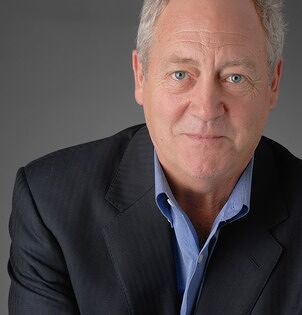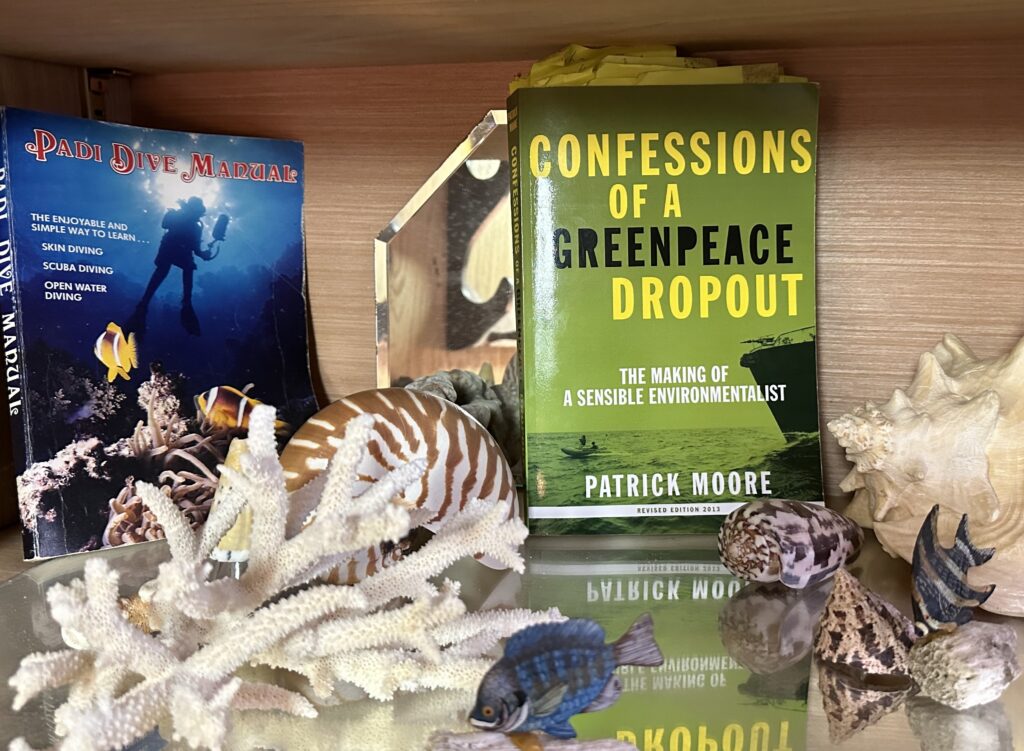
ENB Podcast with Dr. Patrick Moore – Part 1
This is a fun discussion with Dr. Patrick Moore and we discussed his first 15 years in Greenpeace, and why he left. In his book “Confessions of a Greenpeace Dropout – The Making of a Sensible Environmentalist” he covered global whaling, baby seal clubbing, and trying to save humanity from nuclear proliferation and annihilation.
Personally, I have always had a negative connotation for Greenpeace and its mission, and it is clear that I did not hear the entire story. Dr. Moore is truly the “Sensible Environmentalists” and his opinions and insights are more applicable now than in his 15 years at Greenpeace.
With the current geopolitical situation and the current administration, we need to learn from Dr. Moore and become sensible humans.
This is part one, and part two will be released shortly. Dr. Moore is planning on stopping by the ENB podcast soon to cover his new book, “Fake Invisible Catastrophes and Threats of Doom.”
Dr. Moore, thank you for your time and I am looking to future discussions. Thanks for taking the deal that when this podcast gets over 20k in downloads you can buy dinner. – Stu

Time Stamp
00:00 – Intro
01:24 – Dr. Patrick Moore talks about Greenpeace and its background
05:29 – Talks about when they were trying to stop an oil tanker from coming in to do a test in Puget Sound
11:39 – You got arrested because you didn’t follow and in fact, one of the SEALs, you got in trouble and the other guy didn’t. I mean tell us about the seals
13:11 – Talks about saving the whales and Paul Watson is still active against the whaling in Iceland
14:35 – The Reson Dr. Patrick Moore left Greenpeace after 15 years and how Greenpeace was created
16:21 – Talks about the Rainbow Warrior
19:47 – Talks about the Missed opportunity to get the film footage of DR Moore sitting on the baby seal
21:04 – Social media would have changed you all but you guys did phenomenally on getting the story out
22:09 – Talks about the story of Dr. Moore and Bob about the Sperm Whale with a Giant Squid in its mouth
24:03 – Outro

Full Automated Transcript Below – We disavow any mistakes unless they make us smarter or better looking.
Stuart TUrley [00:00:07] Hello Everybody Welcome, you know, I always really enjoy my podcast, but today’s a special day. My name’s Stuart Turley, President and CEO of the Sandstone Group. And I’ve got Dr. Patrick Moore he is the sensible environmentalist, he has confessions of a Greenpeace Dropout and we’re going to bring him back for his new book here in a little bit. I have had a blast reading this book. Patrick, thank you so much for stopping by the podcast.
Dr. Patrick Moore [00:00:38] You’re very welcome, as do any time and, you know, it really is quite a thing to have gone through as a transition I did from being one of the leaders of Greenpeace to being a Greenpeace dropout and it wasn’t my fault they’re the ones who changed, not me. But I’ll tell you the story as we go along.
Stuart TUrley [00:00:55] I’ll tell you, you know, if everybody needs to read this, because you were born in 1947, I believe, somewhere in there. And when you went in and you started going through this whole process, people don’t realize what goodness you did. I’m sorry. I think of Greenpeace as a bunch of nutters, but I didn’t realize the goodness that you, in your first 15 years with Greenpeace was trying to do, tell us about that.
Dr. Patrick Moore [00:01:24] Well, it was the height of the Cold War, the Vietnam War, the threat of all out nuclear war, and the emerging consciousness of the environment all coming together at once in the early 1970s, late sixties, early seventies it was the hippie era, and a lot of us decided we were not in favor of nuclear annihilation of the entire planet in a nuclear war for some reason or other we just didn’t think that was a good idea.
Dr. Patrick Moore [00:01:52] So a number of us, mostly highly educated people, professionals, I was one of the youngest at about 23 at the time. There were doctors and lawyers and engineers and scientists and a captain of a boat, and we all got on that boat and aimed our boat at Amchitka Island in the Aleutians, where the U.S. was conducting underground hydrogen bomb tests of up to five megatons, enough to blow a whole city right off the map.
Dr. Patrick Moore [00:02:22] So two of our leaders, Jim Boland and Irving Stowe, even though they’d never known each other before, this thing coalesced both Quakers, one from Philadelphia, one from New York, a New York lawyer and a Philadelphia engineer.
Stuart TUrley [00:02:36] Okay.
Dr. Patrick Moore [00:02:37] And the Quaker religion has a thing called bearing witness, which means that when an atrocity or crime is occurring, you must go to it and witness it with your own eyes and see for yourself what it is. And so that is what led us to the idea of sailing a boat across the Pacific from Vancouver, Canada, where Greenpeace began right to the island of Amchitka, where the nuclear bombs were going off. And in the meantime, we started getting quite a bit of press interest in this crazy people we’re going to do this.
Dr. Patrick Moore [00:03:09] And we ended up on an island in the Aleutians where the Coast Guard, because we were Canadian, said, You guys have broken the rule of customs there’s no customs agent there in this little island. We were supposed to have checked in somewhere else and we didn’t and so he arrested us all and and told us we had to go back. And this made Walter Cronkite’s evening news across the whole country.
Stuart TUrley [00:03:32] Wow.
Dr. Patrick Moore [00:03:33] But these crazy guys were going up there and they were going to try and interfere with the biggest, most powerful organization in the world, the U.S. Atomic Energy Commission going off bombs and we won. President Nixon not long after that, the remaining nuclear tests that were planned in that series and the rest is history Greenpeace had an incredible victory rate there. We were somewhat handicapped by the fact that because we were going against the United States, people said, Well, why don’t you go to Russia and do this? So you a bunch of commies or something?
Stuart TUrley [00:04:06] Oooh,.
Dr. Patrick Moore [00:04:07] So we got the commie label a little bit because of this, because then we took on the French after that.
Stuart TUrley [00:04:12] Okay?
Dr. Patrick Moore [00:04:13] Because we sort of knew they wouldn’t murder us if we went after Russia we knew they would probably murder us.
Stuart TUrley [00:04:19] Right
Dr. Patrick Moore [00:04:20] We weren’t going to do that because we’re not Russian.
Stuart TUrley [00:04:22] No
Dr. Patrick Moore [00:04:22] We stick to sticking to our own hemisphere kind of thing no where where we may have a chance of surviving. But then came the campaign to save the whales.
Stuart TUrley [00:04:34] Right I love that one.
Dr. Patrick Moore [00:04:36] In 1975 was the first voyage after the first three voyages, one against the US, two against the French we beat them to. They were setting off atomic bombs in the atmosphere still in the early seventies and sending radiation all around the southern hemisphere and they weren’t doing it in France, by the way.
Dr. Patrick Moore [00:04:55] Neither and neither was the United States in a way doing it way out in the Aleutian Islands. We’re always closer to Russia, Japan and Canada, except for Alaska it was closer than anywhere else in the U.S. and we sort of said maybe central Kansas would be a better place to do this.
Stuart TUrley [00:05:10] I vote New York City now.
Dr. Patrick Moore [00:05:11] Sense of humor, too that was one of the nice things about is most of us did have a sense of humor because you need one in a situation like that.
Stuart TUrley [00:05:18] I’ll tell you what, Dr. Moore, sense of humor is taking a look at your pictures in your book and then looking at you. And when you were, I believe it was Puget Sound, when you were trying to stop an oil tanker from coming in to do a test, is that when…
Dr. Patrick Moore [00:05:36] That’s right. It was one of the few cars straight, which is close to Puget Sound and the United States Coast Guard agreed to participate in an exercise with like when when when the Alaska oil started coming down the coast, much of it going to Long Beach, where it’s an easy place to come in there’s no islands in the way or straits or storms or much of anything it’s just a flat, straight coastline.
Dr. Patrick Moore [00:06:02] But in in one of Pucas straight, there are huge storms in the winter and there’s lots of islands in the way. And so they had decided to only allow big supertankers to come in there, not the super big ones. The Exxon Valdez or was it was it the smaller kind.
Stuart TUrley [00:06:19] Right.
Dr. Patrick Moore [00:06:19] Or to these things? So they brought in the beach, San Diego, which btw stands for Big Tanker, and we decided, no, you should stick to the smaller, smaller ones that are easier to stop if you are coming towards a rock or something like that. It wasn’t then. No, we weren’t against oil particularly. We were just against oil spills because the one that happened in Alaska was a terrible disaster. And so we got out and so so we said we’re going to stop the tankers with our little rubber zodiac boats. Right. Which how silly could you be but no, we got in front of them.
Dr. Patrick Moore [00:06:55] And but the Coast Guard, just before this thing was going to happen, made a 2000 yard exclusive zone where nobody could come without a permit or whatever.
Stuart TUrley [00:07:08] Right.
Dr. Patrick Moore [00:07:08] It was for our own safety that they were doing this right? So they were basically drawing a line in the sand, which is exactly what you want them to do, because then you could cross it, right, and get into trouble and get in the newspaper protesting the supertanker. So we did that and it was really that one was actually funny, except for when they threw me down on the deck of a steel boat and handcuffed my arms behind my back here, where you’re not supposed to put handcuffs up back here, because there’s a lot of pinch points here and they should seize them up like that and shut my face down in the steel.
Dr. Patrick Moore [00:07:46] And my friend Rex, the photographer, got shots of all this. And then we were shown handcuffed together, going ashore and being fingerprinted. And now I can’t get a Nexus pass to go into the United States because I got in front of a supertanker.
Dr. Patrick Moore [00:08:01] And it says on the on the form you have to fill out to get the Nexus pass have you ever been convicted of a criminal offense? I have never been convicted of a criminal contempt charge eight times.
Stuart TUrley [00:08:13] Right.
Dr. Patrick Moore [00:08:13] And I’ve been fingerprinted, but I’ve never even been in front of a judge never mind convicted.
Stuart TUrley [00:08:18] Wow.
Dr. Patrick Moore [00:08:19] And yet the Nexus people won’t give me a pass because I was fingerprinted and then we had a good lawyer, too back in those days. He got me out of jail before dark three times, you know, And that’s just wow, that’s a good lawyer when you don’t have to sleep in the cell.
Stuart TUrley [00:08:37] Oh, no.
Dr. Patrick Moore [00:08:38] And it was all theater anyways. I mean, it wasn’t as if we were robbing people or burning down police stations like they do these days.
Stuart TUrley [00:08:46] Oh, yeah. They get away with it.
Dr. Patrick Moore [00:08:47] I mean, an end of that sort of thing. We were happy bunch of hippies, you know, peace, love and joy. But we didn’t want a nuclear war or and we didn’t want giant oil spills and we didn’t want 30,000 whales to be slaughtered every year in the Pacific Ocean by the Japanese and Russians and that’s what they were doing. Still in the mid 1970s there was no need for it.
Dr. Patrick Moore [00:09:08] We have all kinds of artificial oils and and petroleum distillate oils that are perfectly good you didn’t need to have sperm whale oil anymore. The meat is still frozen in some Japanese freezer because there isn’t any demand for it anymore.
Stuart TUrley [00:09:24] Right.
Dr. Patrick Moore [00:09:25] All this time they just kept it there I think they end up using it mostly for pet food. And it’s not right to take a huge, beautiful whale and make pet food out of it. No, we went out there and got in front of the harpoons and it was really fun and and dangerous, but nobody got hurt on our side. And one of the funniest stories was we were told to take ballpoint pens, blue jeans and Playboy magazines to make a peace offering to the Russian whalers, right?
Stuart TUrley [00:09:53] Oh, no way.
Dr. Patrick Moore [00:09:54] Back then it was the Iron Curtain was still well, it was out long if it was down and so there was still this thing where they wanted stuff from the West. And so we.
Stuart TUrley [00:10:05] Jeans and Playboys.
Dr. Patrick Moore [00:10:06] And it was off the coast of California and we look like a bunch of hippies and we sort of worried, but we were smart hippies and, and so we went, we went up to the boat and this guy looked down at us and said, Hey, you guys got at any acid.
Stuart TUrley [00:10:20] Hahahah.
Dr. Patrick Moore [00:10:20] That just killed us? They didn’t want blue jeans and ballpoint pens.
Stuart TUrley [00:10:25] They wanted they wanted acid LSD because.
Dr. Patrick Moore [00:10:30] I guess that’s kind of hard to come by.
Stuart TUrley [00:10:32] All they have to do is go to San Francisco now.
Dr. Patrick Moore [00:10:34] And yeah, well, we are kind of off San Francisco, so no wonder they were hippies without it.
Stuart TUrley [00:10:40] Haight-Ashbury, I guess.
Dr. Patrick Moore [00:10:42] Yes, that’s right. We went and then when we came in to San Francisco, after that harpoon went over, our guys heads into the back of a whale and we had the whole shot from the harpoon and the boat coming along and our boat and then the harpoon going across over top of our guys heads and into the whale.
Stuart TUrley [00:11:00] Wow.
Dr. Patrick Moore [00:11:01] That shot went around the world in one minute as soon as we got it on onto TV and satellite, it went everywhere around the world,.
Stuart TUrley [00:11:09] You know? Yeah. Your book, you say Oil and Electricity save the whales the first time and I really applaud that. And I think you getting in front of the harpoons and having that commitment, you are putting your commitment, you’re putting your bonkers on the commitment line in front of a supertanker.
Stuart TUrley [00:11:28] You’re also doing it when you were stopping clubbing the baby seals and I mean, you got the Bell helicopters and you were flying out there and you got arrested because you didn’t follow and in fact, one of the SEALs, you got in trouble and the other guy didn’t. I mean tell us about the seals
Dr. Patrick Moore [00:11:48] And I was marooned in a helicopter in a blizzard with Brigitte Bardot for a while.
Stuart TUrley [00:11:56] Oh, nice.
Dr. Patrick Moore [00:11:57] My daddy. Yeah, it was there were so many fun things about it we didn’t even mean to make it fun. But I was arrested for loitering in a temporary fisheries office during the seal hunt. Right. You couldn’t make it up?
Stuart TUrley [00:12:13] No.
Dr. Patrick Moore [00:12:14] I walked into the to the tent it was in a motel room it was a temporary Department of Fisheries and Oceans office they’re in charge of discipline. And there’s a thing called a seal protection regulations, which is actually the seal hunt protection regulations is sort of like the Inflation Reduction Act is actually what its Inflation Act or the inflation encouraging act. Right? So we had this thing called the SEAL protection regulations, which were meant to protect the sealers from anybody interfering with them, killing the seals.
Stuart TUrley [00:12:46] And wow, in that story, your guys, was it you and another guy that stopped a ice breaker?
Dr. Patrick Moore [00:12:55] No, I was the photographer on that one. It was Paul Watson and Bob Hunter, all my old colleagues. Bob is gone, unfortunately. And he was an incredible character he was a journalist, writer, comedian around the dinner table. And and Paul Watson is still active against the whaling in Iceland.
Stuart TUrley [00:13:15] Nice.
Dr. Patrick Moore [00:13:15] Out there now actually on his boat and he just he just decided that was going to be his life. And a lot of us went on to other things and I’ve done a million things since then. But that was a really amazing period of time the time that we saved the whales.
Stuart TUrley [00:13:33] Aint that Great.
Dr. Patrick Moore [00:13:34] What we did was the International Whaling Commission is made up of countries and they have country delegations, you know, coming to the conference every year to make the rules for whaling. And we stacked the membership with small island nations that weren’t whaling and actually it was a tourist industry for them for the humpback whales to be offshored.
Stuart TUrley [00:13:56] Oh yes,.
Dr. Patrick Moore [00:13:56] Stuff like that. So we got it stacked. It took about five years to do it and by 1981 the International Whaling Commission voted a majority to ban world whaling worldwide, and only the Japanese have defied that and this crazy guy in Iceland, who’s the richest man in Iceland, I forget his name now, lost him or something, but he’s still going out and killing a few hundred humpback whales every year and that’s where Paul Watson is. So I support Paul for continuing to do that, of course, and he’s done quite a lot of other pretty amazing things in his career, too.
Dr. Patrick Moore [00:14:32] We’re all coming from those same roots, though, of We Care you see what one of the two reasons for I left Greenpeace after 15 years. The first is when we started we had a very strong humanitarian orientation to save humans from nuclear war why would you bother if you didn’t like humans right, then.
Dr. Patrick Moore [00:14:52] Somehow during the period of going forward, the peace kind of got lost and that was the human part people and green for the environment right? So putting Greenpeace together was was clever and it happened by mistake. Someone said peace at the end of a meeting, which was what you did back then when you said goodbye.
Stuart TUrley [00:15:11] With piece.
Dr. Patrick Moore [00:15:13] And so and one of our guys said, Why don’t we make it a green piece just like that? And there was it was born. And we changed our name from the Don’t Make a Wave Committee, which isn’t very memorable. But it but it was because of the Alaska earthquake we that we were bringing up the idea that a five megaton hydrogen bomb on a big fault line which the Aleutians is could make a tsunami and and wreck our cities or something like that.
Dr. Patrick Moore [00:15:39] But anyways, Greenpeace was much better and we went ahead with that as the first the name of our boat. Initially, we renamed the Phyllis Cormack, which was the the Halibut boat. That John Cormack, Captain and Phyllis Cormack, his wife was the name of the boat. But just before we left, somebody came in with with a plaque that said Greenpeace on it and why don’t we nail that on the bow of the boat? And so it became the Greenpeace first before right before it was an organization called Greenpeace. The Greenpeace was the boat we were going to stop the bomb and it had the funny.
Stuart TUrley [00:16:17] And now which one up you had.
Dr. Patrick Moore [00:16:21] The Rainbow Warrior then already? That’s the one that got bombed in New Zealand by the French, right? That was 1985, just before I left. In fact, I was one of the I was one of five international directors for we had two boards in Greenpeace International. We had the European group, which was France, Germany, Netherlands and London and England were all national Greenpeace organizations.
Dr. Patrick Moore [00:16:52] And then we had Canada, US, Australia, New Zealand, we call that and Anzco, which is the, you know, the letters put together. And I was the Director for Canada on the international board. We Anzco directors went to New Zealand to welcome the Rainbow Warrior in on its way to him to morrow, to the atoll where these atomic bomb tests were going on. By that time they had gone underground it took us two years, only two years we forced them underground. because they were the only country doing a lot of aboveground nuclear testing and they were doing it in the southern hemisphere, way away from themselves.
Dr. Patrick Moore [00:17:31] And no French citizens even knew about it because the French actually had a complete stranglehold on the media at that time in the mid 1970s. So we were the first people we went to France while our boat was on its way to Morrow we went to France and occupied the Notre Dame Cathedral.
Stuart TUrley [00:17:52] Oh, how cool.
Dr. Patrick Moore [00:17:53] And said, This is a church and we are taking sanctuary here tonight and the secret police, Sureté came and said, Sorry, you guys, this is not a church, it’s a national monument and we’re taking you to jail if you don’t leave at 9:00. But that did it.
Dr. Patrick Moore [00:18:10] Le Monde, the biggest newspaper in in France, told a story the next day to the French people that these these crazy people were there protesting against the atmospheric nuclear tests. And that started the ball rolling and it took two years of voyages into the atoll from New Zealand is 2600 miles. So it was even way further than we had to go to get to the Aleutian Islands but a small sail.
Stuart TUrley [00:18:35] Days of a ship crossing.
Dr. Patrick Moore [00:18:37] It was that we wenthat kindt in in a 36 foot sailboat.
Stuart TUrley [00:18:41] That’s nothing. I mean, that’s small.
Dr. Patrick Moore [00:18:43] It is, yeah. But the people do that they go worldwide and 36 foot boat is considered sufficient for worldwide navigation with sail. So it went into the first year the French boarded the boat and beat the captain and said that he and he and he fell on pretty hurt around his eye. Oh, because they mentioned him and the French said he had fallen while they were coming aboard.
Stuart TUrley [00:19:10] Right.
Dr. Patrick Moore [00:19:11] Tried to make it, but Mary And Marie Horne was up through a hatch at the bow with a camera and took pictures of the beating. And that made it in the newspaper the next morning with David with a big patch over his eye went worldwide. So it’s those kind of things you know, if you can create enough drama, you get the attention and that’s what we were that was our whole modus operandi was to get in the newspapers.
Stuart TUrley [00:19:37] There was one of your stories that you missed the opportunity to get the picture, and it was a pretty significant one. I can’t remember. You guys were just me.
Dr. Patrick Moore [00:19:47] Missed the opportunity to get the film footage of me sitting on the baby seal. Yes, we got the still footage, though, but it was really a shame because we had a color film sequence of being arrested by the. RCMP and the Fisheries Department, and I was on top of the seal. Hold it like riding it right, Right with my hands under its front flippers.
Stuart TUrley [00:20:08] And you were trying to saving it.
Dr. Patrick Moore [00:20:09] Me as a tough little bugger, but and it was they’re strong. It’s like they’re half the size of me, these baby seals. So here I am writing this baby seal while everybody’s around taking photographs. Right. And of course, as soon as the fisheries officer touched me, I went peacefully, which was our modus operandi as well.
Stuart TUrley [00:20:30] Now, did your boat your hair back then was about like this? I mean.
Dr. Patrick Moore [00:20:34] I’m I am trying to return to my hippie roots these days, but. Well, it’s not looking too bad
Stuart TUrley [00:20:42] No you look great. I’m very jealous.
Dr. Patrick Moore [00:20:44] I didn’t need the comb over back then. And even now, it doesn’t really do much.
Stuart TUrley [00:20:49] Oh, no, my. I had a comb over when the kids were little and when I did go out on the ski boat, I realized that when I had a flipper going up this way, it was time to get rid of the comb over. All right? Yeah. So wouldn’t we sit back and, you know, social media would have changed you all the you guys did phenomenal on getting the story out. I’m just amazed that it got out there that well.
Dr. Patrick Moore [00:21:14] Well, it is. It is amazing what you could do back then. I mean, we were on a old fashioned radio telephone on a boat half the time, you know, side band radio. But we got it out and we wrote it down and got it out, you know, in good right verbiage. And we had a lot of effective writers that were professionals.
Stuart TUrley [00:21:35] Nice.
Dr. Patrick Moore [00:21:36] Bob Cummings was a professional critic of music and opera and symphony, you know, I mean, he could write a beautiful piece of prose and that and Bob Hunter had his second front column on The Vancouver Sun, the biggest newspaper in western Canada. Right. But we had good people and with talent and I was nicknamed quite quickly Doctor Truth, because I insisted on then what we put out was actually accurate.
Stuart TUrley [00:22:06] Right.
Dr. Patrick Moore [00:22:07] And I made exceptions for it, especially when, when Bob, we were at a point where there was nothing to do we had to wait for the state for the Russians to come and we were trying to make up stuff to keep people interested. And there is this myth that when the full moon rises, the sperm whale comes up out of the water and makes a silhouette in front of the full moon with a giant squid in its mouth right now and that’s quite an image, right?
Stuart TUrley [00:22:34] Yeah.
Dr. Patrick Moore [00:22:35] And so we it was going to be the full moon and so Bob got that story in newspapers all across the country that the whale might. that we were going out to see if we could be there when the whale jumped up with a squid in his mouth in front of the full moon. Of course, I’m sure nobody actually ever saw that in the history of the world, but it sounded good. But it does sound good and it makes a good graphic so that people made a graphic of it then.
Stuart TUrley [00:23:02] Oh, yeah.
Dr. Patrick Moore [00:23:03] Yeah. And published it with the story so it was it was a cool story know, I’m not against that kind of.
Stuart TUrley [00:23:10] When you did go out and look for it.
Dr. Patrick Moore [00:23:12] I did go out and look for it. Yes.
Stuart TUrley [00:23:14] Yeah.
Dr. Patrick Moore [00:23:15] So was out there and well, we had to make a vivid image of it instead.
Stuart TUrley [00:23:20] Oh yeah.
Stuart TUrley [00:23:22] Hey, thank you everybody for listening to the first part of the Dr. Patrick Moore podcast. This is an exciting discussion. I had an absolute blast visiting with Dr. Moore. In fact, we’ve got some more discussions coming up.
Stuart TUrley [00:23:38] We’re going to be talking about his new book later on next month so also, don’t forget to Subscribe Like Share, give us five star reviews. And I really thank all of our wonderful listeners and all the great feedback. Thanks. And we’ll see you real soon to see.



